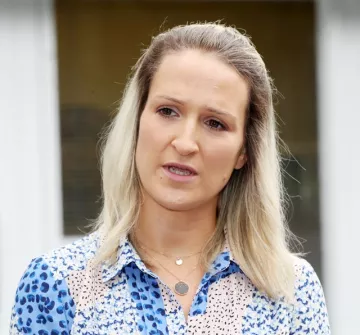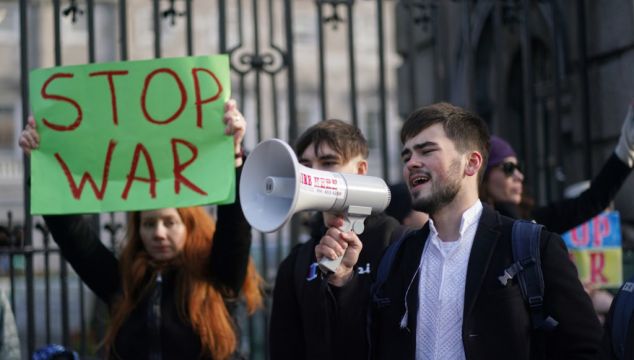Minister for Foreign Affairs Simon Coveney has said he hopes the world is seeing the “first step” towards the ending of war, ahead of talks between Ukrainian and Russian officials.
However, he added the meeting will not be enough to deter the EU from imposing fresh sanctions.
On Sunday, the office of Ukraine’s president said a delegation will meet with Russian officials as Moscow’s troops draw closer to Kyiv.
Ukrainian president Volodymyr Zelensky’s office said on the Telegram messaging app that the two sides would meet at an unspecified location on the Belarusian border and did not give a precise time for the meeting.
Let’s hope this can be a first step to ending Russia’s war against Ukraine.
But be clear, EU Foreign Ministers meet tonight to increase targeted sanctions against Russia for unjustifiable aggression & to substantially increase our support for Ukraine. https://t.co/jWmupvrlnQAdvertisement— Simon Coveney (@simoncoveney) February 27, 2022
Mr Coveney tweeted: “Let’s hope this can be a first step to ending Russia’s war against Ukraine.
“But be clear, EU foreign ministers meet tonight to increase targeted sanctions against Russia for unjustifiable aggression & to substantially increase our support for Ukraine.”
Earlier, the Irish Government confirmed it is to close off the State's airspace to all Russian aircraft.
On Sunday morning, Mr Coveney said Ireland will move to shut off the country’s airspace to Russian planes.
He tweeted: “Shocking Russian attacks on Ukraine overnight. Ireland will move to shut off Irish airspace to all Russian aircraft.”
Mr Coveney also called on other EU countries to do the same.
Various European countries – including the Czech Republic, Slovenia and the Baltic nations of Estonia, Latvia and Lithuania – have already decided to close their airspace to Russian airlines.
The UK has made a similar decision.
Shocking Russian attacks on Ukraine overnight. #Ireland will move to shut off Irish Airspace to all Russian Aircraft. We encourage other EU partners to do the same. We also support new wide-ranging sanctions to be agreed today at EU FAC & new assistance package for #Ukraine. 🇺🇦 https://t.co/tL7UriHsah
— Simon Coveney (@simoncoveney) February 27, 2022
“We encourage other EU partners to do the same,” Mr Coveney said.
“We also support new wide-ranging sanctions to be agreed today at EU FAC (Foreign Affairs Council) & new assistance package for Ukraine.”
The US, European Union and UK have agreed to block “selected” Russian banks from the Swift global financial messaging system in retaliation for the Russian invasion of Ukraine.
“Restrictive measures” will also be imposed on Russia’s central bank.
Minister of State for European affairs Thomas Byrne tweeted late on Saturday that he was “relieved” a decision on Swift had been agreed.
The Department of Foreign Affairs has told Irish citizens to avoid non-essential travel to Russia.
In an update to travel guidance, the department said: “Due to the ongoing disruption to flight services to and from Russia, the Department of Foreign Affairs is advising citizens to avoid non-essential travel to Russia at this time.
“Further flight cancellations and uncertainty on travel routes from Russia are expected in the coming days.”
Relieved 🇪🇺 agreement reached on Russia SWIFT sanctions.
I said on @morningireland yesterday, @MichealMartinTD gave Ireland’s strong support to this and for the strongest possible sanctions against Russia at #EUCO— Thomas Byrne (@ThomasByrneTD) February 26, 2022
Mr Byrne predicted that the latest sanctions imposed by the EU will have an “absolutely devastating effect on the Russian economy, and (Russian president Vladimir) Putin’s own personal resources”.
In an interview with the BBC, he said Ireland would back calls for Ukraine to be a candidate for EU membership.
Mr Byrne said the country “absolutely would support” such a move.
He also indicated that a de facto ban on Russian aircraft in Irish airspace has already come into effect.
“I think effectively that’s already starting to happen,” he said.
“Because, at the moment, there’s a ban on airplanes being exported into Russia and aircraft parts, and that means, for example, that a plane going to Russia actually from any country can’t bring new parts on the plane, even for itself.
“So already we’ve seen Western airlines cancelling flights. I think it will be completely untenable for Russian airlines to fly anywhere into the Western world very, very soon.”
Minister for Justice Helen McEntee also said she expects that decision to be put into practice “quickly”.
Speaking on RTÉ Radio, she indicated the Government has not ruled out diplomats or Defence Forces members being sent close to the western Ukrainian border to support anyone trying to reach Ireland.
She said on Sunday that her department had reacted quickly to put in place a visa waiver scheme for Ukrainian nationals hoping to enter Ireland.
“What we’re doing now is making sure that, when people cross the border – because you have hundreds of thousands of people crossing into Poland, into Romania and other neighbouring countries – is that there is financial assistance and support to provide for our member state colleagues to be able to assist these people.

“What we’re making sure is that it is as easy as possible for them and their Ukrainian family members, or for those who are seeking to travel to join family members here, that it is as easy for them to do so.
“But we have to be clear here – there are no planes flying into Ukraine. And there’s no ability for us to get into Ukraine.
“What we can do is encourage people, where it is safe to do so, to travel to the border; where it’s not, to try and find shelter.
“But we have been engaging with people for weeks now. We will continue to engage with them even though we don’t have a consulate or we don’t have an embassy on the ground.”
Asked on RTÉ Radio whether diplomats or Defence Forces members might be able to help out or meet people at the border, she said: “I think all of these things need to be kept under review. We have our consular assistance in all of these European member states.
“In particular in Poland, in Warsaw, we have a lot of people who are engaging with people who are crossing the border – helping them and also helping those family members who are Ukrainian nationals.
“I think a lot of people who will initially seek to travel to Ireland, they’re Irish citizens, but also they’re people who might have family living in Ireland or they might have business connections or they might have friends.
“And that’s really what we’re seeing initially. While we’ve had quite a small number of people, I think in the last few days, the vast majority of those who have come into Ireland are people who have family, who have friends, who have those connections.”







